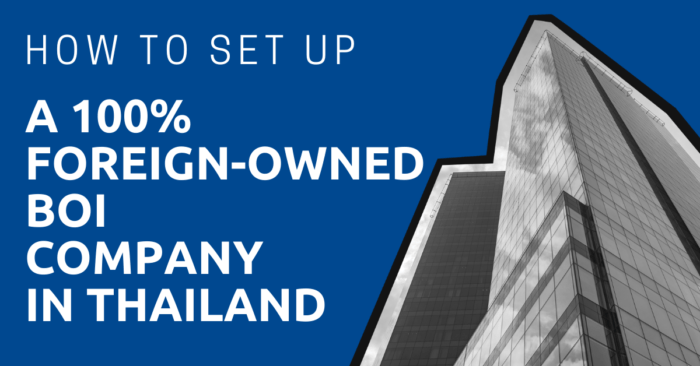
Do you have a great idea for a business and wonder if Thailand is the right place to register your company?
Do you run an existing company in Thailand and are you looking for tax breaks and other benefits?
Fortunately, you can register your company with Thailand’s Board of Investment and own 100% of your company while getting plenty of benefits.
This guide shows you how to setup your company with Thailand’s Board of Investment, the advantages and disadvantages of the promotion, and how to keep your promotion active.
If you plan to do a business in Thailand, do not forget to check out our premium subscription on a Business tier, at $13.33 a month, you get immediate access to insider advice and tools to help you run your business.
"*" indicates required fields
Disclaimer: This article may include links to products or services offered by ExpatDen’s partners, which give us commissions when you click on them. Although this may influence how they appear in the text, we only recommend solutions that we would use in your situation. Read more in our Advertising Disclosure.
Contents
We have exclusive business content with insider business tricks that you can’t find anywhere else.
By becoming a subscriber of our Business tier, you can get immediate access to this content:
- Karsten’s List of Personal and Professional Services
- A Step-by-Step Guide to Registering a Company in Thailand on Your Own
- Taxes You Have to Deal with as a Business Owner in Thailand
- Employee Regulations You Must Know as a Business Owner
- Increase Your Chances of Getting Tax Refunds for Your Company
That’s not all. You get a free consultation with a corporate lawyer, a free consultation with an accountant, enjoy ExpatDen ad-free, and get access to over a hundred pieces of exclusive content to make your life in Thailand hassle-free.
Here is the full list of our exclusive content.
To get access to these exclusive business guides and more, become a subscriber.
What is Thailand’s Board of Investment?

Thailand’s Board of Investment, or BOI, is a government organization that:
- promotes investment opportunities in Thailand and overseas
- brings innovation and technology into Thailand
- increases economic growth in Thailand
The BOI’s role is to help you invest in and open businesses in Thailand while providing you with benefits along the way, including up to 13 years of tax exemption, 100% foreign ownership, and work permit and visa help.
Promotion Benefits
If your company gets promoted by the BOI your company gets both tax and non-tax benefits.
The tax benefits include:
- exemptions or reductions on corporate taxes
- exemptions import duties on machinery and raw materials in research and development businesses
- exemptions on production for export
The non-tax benefits include:
- 100% foreign ownership
- visas and work permits
- land ownership
You should keep three things in mind when considering BOI promotion benefits.
First, investment promotion benefits don’t apply to your whole company but only a section of your business.
For example, if your company deals with software and food, and you get the investment promotion for your software business, you can’t apply the BOI benefits to your food business.
Second, benefits start when you get your investment promotion certificate, which the BOI gives you after they approve your case.
Third, the BOI must approve each benefit in writing.
Tax Exemption
When your company is promoted by the BOI it doesn’t have to pay corporate income tax for up to 13 years. The number of years depends on your company’s location and line of business.
Some companies can get a three-year exemption on corporate income taxes while some businesses might not get any exemption.
You usually get a corporate income tax exemption of 50% of the total amount invested in your company. The limit can be more or less depending on your business category.
Even with a tax exemption cap of 50% your company benefits from the lower cost of doing business in Thailand.
To start getting the full corporate income tax exemption benefit, you must have approval from both certified audits and the BOI within 120 days after the end of your accounting period.
If your company can’t get full corporate income tax exemption status you can get up to a 70% deduction on corporate income taxes for five years if you do business in a key investment area listed by the BOI.
Your company doesn’t have to pay corporate income taxes and import duties or get reduced corporate income tax rates or import duties.
Related article: Thailand Business: Filing a PND 50 Annual Income Tax Return
Import Duty Exemptions
If you run a manufacturing company that exports raw products or does research and development your company doesn’t have to pay import duties on manufacturing machines and raw goods.
Non-Tax Incentives
Your company gets three non-tax incentives if it’s promoted by the BOI.
They are:
- 100% foreign ownership
- visas and work permits
- land ownership
100% Foreign Ownership
If you register a company in Thailand you can own only 49% of the total company shares. But you can own 100% of your company when your company is promoted by the BOI.
You have to find two other shareholders because you need at least three shareholders on a company’s registration. Shareholders can be family members of friends.
Visas and Work Permits
You and your staff can get visas and work permits without having to go to the Immigration Center at Chaengwattana.
Instead, you go to the One-Stop Service Center in Chamchuri Square Building in Bangkok—just a few minutes walk from the MRT Sam Yarn station—where they help you with your visas and work permits.
You and your workers don’t have to go back and forth between the Immigration Center and the Ministry of Labour when applying for, extending, and renewing visas and work permits. You can do these things at the same place, on the same day, and at the same time.
If you’re married or have children, your spouse and kids are also entitled to visas. The BOI gives you the necessary documents to apply for your relative’s Non-O visas so they can live in Thailand while you work.
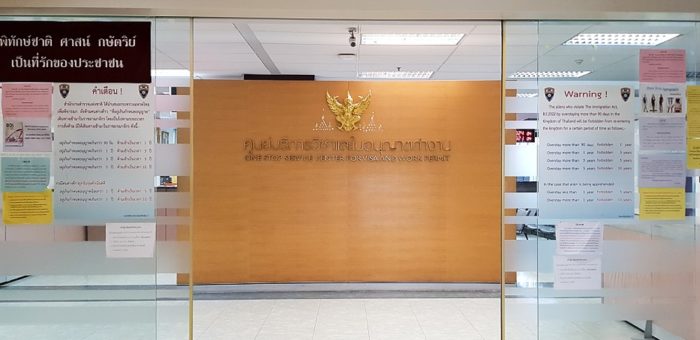
Land Ownership
You can’t own land as a foreigner in Thailand under Thai law. But your company can own land in Thailand if it has a BOI promotion.
You can use this land for building factories, offices, or living spaces for workers. If you close your company, you must sell the land within one year.
Requirements
Your company is eligible for BOI promotion if it falls under one of the eligible activities, and each activity has its own requirements.
For example, to get BOI promotion for a software company, your company needs to have a minimum capital investment of THB1,500,000 and develop software that Thailand needs at the time.
Your company could also get BOI promotion if it transfers knowledge to Thai employees. You can read about this is the Applying for Your Investment Promotion section.
Keep in mind that these requirements could always change based on Thailand’s needs.
Check BOI’s List of Business Categories
To get a BOI promotion you must first check if the type of business you do or plan to do is listed as one of the four business categories.
These four business categories are:
- Agriculture, Food, Biotechnology, and Medical Industries
- Machinery, Automotive, Electrical Appliances and Electronic Industries
- Metal, Material, Chemical and Petrochemical Industries and Public Utilities
- Digital, Creative Industries and High Value Services
Check BOI’s List of Eligible Activities
If your company does business in one of the four categories above, you next have to check if the activities your company does are listed as eligible on the BOI’s website.
If your company performs one of the eligible activities it’s one step closer to BOI promotion.
You can read through the 70+ eligible activities within the four business categories to find out if the activities your company performs makes it eligible for BOI promotion.
Build Capital Investment
Capital investment is the funds you or other people invest in your company to further its business goals.
Your company must have at least 1,500,000 baht in capital when you apply for BOI promotion.
You must have at least ten million baht in capital if you run a co-working space.
You can check the exact capital investment you need on the eligible activity.
You don’t have to show the capital in cash. The capital can include the cost of construction and machinery, company assets, rental contract, and other business expenses.
But you can’t apply land value and money used for payroll, to produce goods, and to perform daily operations toward the capital.
Balance Debt-to-Equity Ratio
Debt-to-equity ratio is a calculation that shows how much financial leverage your company has.
Your company’s debt-to-equity ratio can be a maximum of three to one. This means your company’s debt can’t be three times higher than its capital.
The BOI wants to be sure you don’t take out a loan to run your company, which increases the chance of bankruptcy later on.
If your company’s debt-to-equity ratio is higher than three to one, you must increase your company’s equity or decrease your company’s debt.
But this three-to-one ratio rule only applies to new companies. If you run an existing company, the BOI considers applicants on a case-by-case basis.
Incentive Groups
The BOI separates companies into six groups, which all get the same non-tax incentives but different tax incentives.
The BOI categorizes these six groups based on Thailand’s current demand, required technology level, competitiveness, and impact to existing investments.
A1 is the highest group and comes with an eight-year corporate income tax exemption. Companies categories in this group include:
- research and development
A2 is the second-highest group and comes with an eight-year corporate income tax exemption. A majority of businesses in this group are infrastructure activities using advanced technology that produce value-added products.

A3 is the third-highest group and comes with a five-year corporate income tax exemption. Companies in this group include companies with high technology activities.
A4 is the third-lowest group and comes with a three-year corporate income tax exemption. Companies in this group are like companies in the A1 through A3 groups but deal with lesser technologies.
B1 and B2 are the lowest group and come without any corporate income tax exemption. But companies in this group don’t have to pay import duties on machinery.
Your company can also get a 10-year uncapped tax benefit if you do business in technology activities as required by the Board of Investment at that time..
Merit Based Incentives
The BOI gives you merit based incentives, or privileges, to encourage enhanced competitiveness. Some of these merit based incentives are:
- up to three years of corporate income tax exemption
- up to five years of tax deductions
tax deductions for infrastructure and utility costs
To qualify, your business needs to be at one of the three locations in need of investment:
- one of the 20 provinces in Thailand that have the lowest capital
- industrial zones
- four provinces in Southern Thailand
Your company must have the minimum number of workers or investment value listed by the BOI for your location.
The BOI’s website has an infographic summarizing the incentive groups and merit-based incentives.

Applying for Your Investment Promotion
It could take you anywhere from three to six months to apply for a BOI promotion if you hire a lawyer to apply for you. It can take even longer if you do it yourself.
You can apply yourself but you need to be familiar with the Thai legal system and the way government offices in Thailand work.
However, BOI officers are helpful and can help you get the investment promotion.
If you decide to use a lawyer, hire a lawyer who has successfully helped companies not only get BOI promotions, but also get BOI promotions in the business category your company is listed under.
Corporate Lawyers in Thailand
FRANK Legal & Tax (Bangkok)

FRANK Legal & Tax is a boutique law firm with locations in Bangkok and Phuket. It specializes in real estate, corporate, and commercial laws.
Contact FRANK Legal & TaxBanchee Legal House
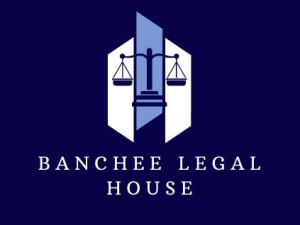
A law firm in Bangkok with a broad range of legal and business services to offer their clients.
Contact Banchee Legal HouseFiling the Forms
You must fill out the forms for your company’s business category. You can get the forms from the https://boi-investment.boi.go.th/public/.
You must create an account there and complete all the steps online.
The forms are eight to ten pages long and filled with questions about your company’s status, shareholders, investment plan, product development, targeted customers, technology transfer, and more.
The BOI wants to know the following information:
- the total amount of registered capital and a plan on how you’re going to use the investment in your business
- details about your project, such as the type of software or machinery you’re going to use and the processes involved
- the number of Thai and foreign employees you plan to employ and their yearly salaries; in some instances, the BOI provides a minimum salary for key personnel per year
- a training plan for Thai employees, specifying training courses and/or a plan for technology transfer
- details of the management team, including their skills and qualifications
- the estimated revenue and expenses of your business for the first three years of operation
The BOI places a lot of emphasis on knowledge transfer, so you write on your forms how you plan to transfer knowledge to your Thai employees.
Three questions to keep in mind are:
- What teaching modes is your company going to use?
- Which technologies is your company going to transfer to your Thai employees?
- How long will it take your company to transfer this knowledge to your Thai employees?
It’s important to fill out every part of the form. If you don’t, you might have to visit the BOI several times, re-submit the forms online, or even have your forms rejected.
Interviewing
After you submit the forms, the BOI should contact you within ten working days to make an appointment for an interview.
You should prepare and dress formally for all interviews.
The interview is usually a one-on-one interview with the BOI officer in charge of your account. But it could involve other BOI officers.
During the interview, BOI mainly wants to ask you questions about your company and clarify any points that weren’t clear in your application.
In addition to the first interview with the BOI officer, you may have a second interview with related government organizations. The second interview is usually more intimidating than the first one.
For example, if you apply under the software or ecommerce business categories, you must go for a second interview with representatives from Thailand’s Digital Economy Promotion Agency under Thailand’s Ministry of Digital Economy and Society.

Getting Approval
After you interview with the BOI and related government organizations, your forms are evaluated and considered according to your company’s investment amount.
It’s not unusual for the BOI representative in charge of your case to contact you to clarify anything on your application before submitting your application for evaluation.
If your investment is below 80 million Thai baht the BOI handles your case.
If your investment is between 80 to 750 million Thai baht a subcommittee handles your case.
If your investment is above 750 million Thai baht a subcommittee and the BOI’s board of directors handle your case.
The BOI lets you know if your forms are approved in between 40 and 90 working days and tells you when you can start running your business.
If your forms get rejected then you have to adjust your business plan and reapply or apply with a new project that meets the BOI’s criteria.
Getting Accepted
Once the BOI approves your application, you have to go to the BOI headquarters and get your approved documents and promotion acceptance form.
You have one month to submit your promotion acceptance form. If you don’t submit it within one month you could lose your BOI promotion.
Registering Your Company
Once you submit your promotion acceptance form you have to register your company with the Department of Business Development.
You can skip this step if your company is registered with the Department of Business Development.
Getting Your BOI Certificate
Once you submit your promotion acceptance form and register your company with the Department of Business Development, you must register for a company account on the BOI’s e-investment platform. This is the last step in your application process.
You have to submit the following documents:
- your company’s memorandum of association
- your business registration certificate
- the certificate of the Office of the Company Limited and Partnership Registration
- a list of shareholders and their nationalities, certified by the Office of the Company Limited and Partnership Registration
- documents showing the transfer of funds from overseas (in the case of foreign investment)
- a joint venture contract, licensing agreement, and technical assistance contract (if any)
- the Utility and Manpower Requirements Form
The BOI gives you six months to register your company and submit the documents.
Once you submit the promotion certificate form and the documents, the BOI issues your certificate within ten working days.
If for any reason you can’t register your company and submit the documents within the six-month period, you can extend it to another four months, with a maximum of three, four-month extensions.
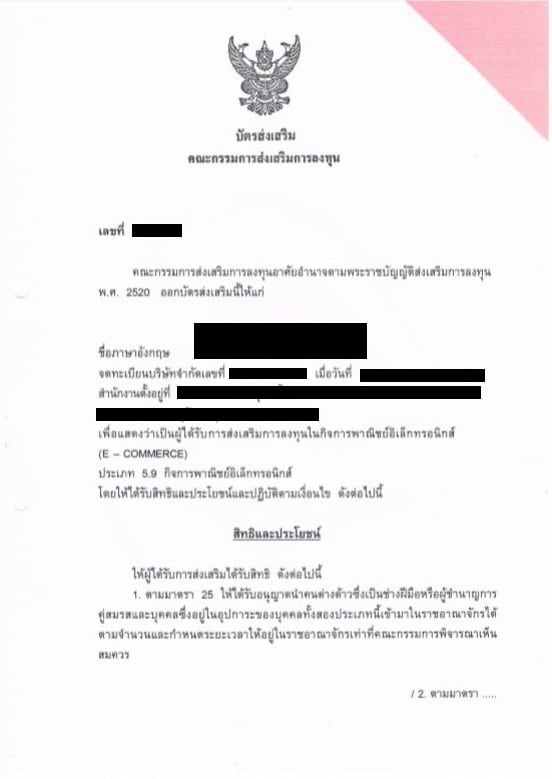
Applying for Visas and Work Permits
After you register your company, you can apply for visas and work permits at the One-Stop Service Center for Visas and Work Permits at Chamchuri Square.
BOI promoted businesses aren’t bound by the four-to-one ratio of Thai to foreign workers, nor the amount of paid capital you need to hire foreign employees.
Application Cost
You don’t pay any government fees for applying for a BOI promotion. But that doesn’t mean applying is free. You pay in the form of time and resources you use when applying for your BOI promotion.
Keeping Your Investment Promotion Active
After you get your BOI promotion certificate your responsibilities don’t end. Requirements and restrictions, which are listed on your investment promotion certificate, vary based on your business category.
The BOI has the right to cancel your promotion if you don’t follow their rules or you abuse the benefits.
You can find a list of common requirements and restrictions in the following sections.
Submitting Your Permission for Operation
Three years after you get your investment promotion, you must submit the Permission for Operation form to the BOI along with financial documents, your company affidavit, and a list of your company’s shareholders.
The BOI wants to make sure that you’re using your investment as planned, including reaching the investment amount as specified on your investment promotion certificate.
The BOI may send their staff to inspect your company during this process.
If you can’t submit the Permission for Operation form, you can do it later if the BOI says it’s okay.
Using Benefits for BOI Promoted Businesses Only
You must apply benefits for workers, land, machinery, raw materials, and taxes only to your BOI promoted businesses.
You can’t sell, lease, or transfer machinery and land unless you get the BOI’s approval.
If you use these benefits for other business outside of your investment promotion, you run the risk of getting your investment promotion certificate cancelled indefinitely.
Hiring Foreign Workers
You aren’t limited to how many foreign employees you can hire in your company.
But the number of foreign employees you hire should be appropriate to the size of your company.
And you must have reasonable supporting documents and explanations on why you need each foreign employee.
You must have Thai employees in your company even if your company is promoted by the BOI.
Before you hire foreign employees you must get approval from the BOI through the e-Expert system.
Your foreign employees must also regularly transfer skills and knowledge to your Thai employees. The BOI calls this “technology transfer.”
Each time you hire a new foreign employee or renew your current foreign employee’s visa, you must write a clear plan on how your foreign employee is going to transfer technology to your Thai employees.
Your plan must include a purpose and time frame for transferring technology.
Once you get approval, the BOI gives you the approval letter for your employee’s visa and work permit application. With this document, you can almost guarantee the success of your employee’s application.
If the BOI rejects your request to hire a foreigner you can re-submit your application online until they approve it.
Firing or Losing Foreign Workers
If you fire or lose a foreign employee you must tell the BOI within 15 days. You can do this through the BOI’s e-Expert system.
Reporting Finances
You must make separate financial reports between your BOI promoted business and non-promoted business, if any, and report your finances to the BOI every six months, 12 months, and 24 months from the date you get your BOI certificate.
You also have to file annual finance reports by July 31 of each year. Your finance reports should be prepared by an accountant who has experience dealing with BOI promoted companies.
You can have an accountant who is not familiar with the BOI report your finances for you. But you run the risk of penalties for any mistakes included in the report.
Updating Your Company’s Info
Every time you move your company to a new address, update your company’s list of shareholders, or close your company, you must tell the BOI.
You also need the BOI’s approval if you don’t run your business for two or more months.
Should I Get BOI Promotion?
It’s always recommended to get the BOI Promotion if your business is eligible for it. Benefits are wellworth.
However, BOI Promotion isn’t perfect.
If your company gets promoted by the BOI your company faces a few disadvantages, including a complicated setup process, detailed accounting, and regular BOI inspections.
Let’s take a look.
Complicated Set-Up
It can take three to six months or more to apply for a BOI promotion because of the bureaucracy involved, documents needed, and back and forth trips to the BOI headquarters.
Because of the time and resources needed, lawyers firms charge you more to apply for a BOI promotion than they would to do a standard company registration in Thailand.
Take a look at the Applying for the Investment Promotion section to find out more.
Accounting
Benefits you get from the BOI only apply to certain areas of business within your company, not your entire company.
This complicates your company’s accounting. Your accountant has to define and separate income and expenses between the part of your company that’s promoted by the BOI and the part that’s not.
The BOI also asks for financial reports every three months, six months, one year, and two years, depending on your promotion duration. Your accountant must answer the long list of accounting and tax questions clearly, accurately, and in detail.
This means you’ll pay more for accounting services than you would if you were running a non-BOI promoted company.
So be sure to hire an accountant in Thailand who knows how to report finances for BOI promoted companies.
Inspections
The Revenue Department closely inspects your company if it’s promoted by the BOI. They want to make sure you’re applying your tax incentives only to the areas of your business that are related to your BOI promotion.
If you give the wrong answer to one of their inspection questions it could trigger a misunderstanding and you could end up in court. Then you need to hire a lawyer in Thailand to prove you meant no wrongdoing.
To prevent this from happening you should:
- know the details of your BOI promotion
- make sure your business is operating 100% legally
- use an accountant experienced with BOI promoted companies
Cancelling Your Investment Promotion
Cancelling your investment promotion is easy. All you need to do is to contact the BOI and they may ask for a few documents such as a company registration and a company letter explaining why you want to cancel your investment promotion.
But cancelling your BOI promotion immediately cancels your tax and non-tax incentives.
If you cancel your BOI promotion in the first three years without getting your Permission for Operation, you need to refund all exempted tax and import duties to the government with fines and interest.
If you have the Permission for Operation, you don’t have to pay any back-taxes with fines and interest. But you have to pay import duties for imported machinery. And you can no longer export raw materials without paying taxes.
Now, on to You
We wrote this article based on our experience with doing business in Thailand and applying for a BOI promotion.
The BOI may change the requirements we’ve mentioned in this guide at any time. So, it’s always best to check with the BOI or a lawyer who is experienced with BOI promotions.If you need our help with applying for a BOI promotion, contact us through this form.






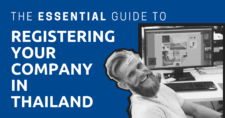
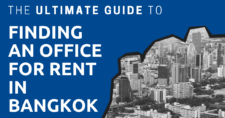

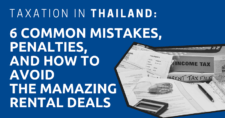
I thought that education was one are that BOI also promoted, specifically private schools.
Hi. I found your website very useful. Look forward to reading and learning more about operating here in Thailand, so as to grow alongside Thailand.